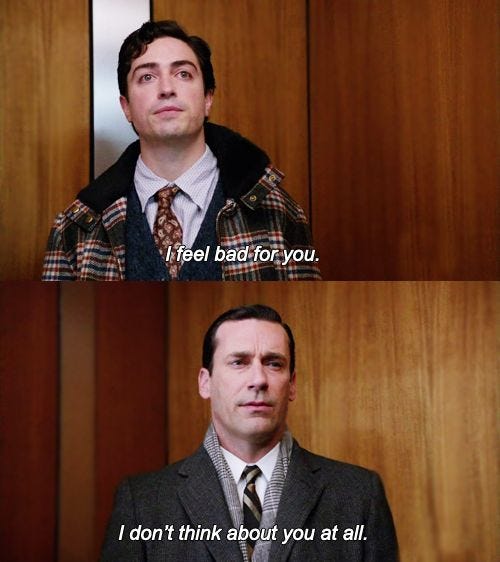Overcoming The Spotlight Effect
How Realizing You’re Not the Center of Attention Can Set You Free
I believe there are two big mistakes that most of us make in the course of our lives.
First, we worry about what others are thinking about us
Second, we deceive ourselves into believing they think about us at all.
This common psychological phenomena is called"Spotlight Effect." It’s the feeling that all eyes are on us, that our every move is being scrutinized by those around us. This effect can significantly impact our confidence and behavior, often leading us to feel self-conscious or anxious in social situations.
Understanding the Spotlight Effect
At its core, the Spotlight Effect is our tendency to overestimate how much others notice our actions, appearance, and behavior. We believe that our mistakes, imperfections, and even our achievements are the center of everyone else's attention. The reality, however, is quite different. Most people are preoccupied with their own lives and concerns, paying far less attention to us than we think.
Here’s the real secret: Nobody cares.
Once you realize that you’re not the center of attention, you find you’re much, much more free than you ever thought possible.
The Roots of the Spotlight Effect
This phenomenon can be traced back to our evolutionary history. Being highly attuned to the social dynamics of our group was crucial for survival. Standing out too much could attract unwanted attention from predators or competitors. While these dangers are no longer as relevant, the psychological mechanisms remain.
In modern society, this heightened awareness often translates into social anxiety and self-consciousness. We worry about what others think of us, and this worry can hinder our ability to perform and interact confidently.
Strategies to Diminish the Spotlight
Understanding that we’re not the focal point of everyone else’s thoughts can be liberating. Here are some strategies to help "dim" the spotlight and reduce the associated stress:
1. Awareness and Perspective: Recognize that others are not as focused on you as you might believe. Everyone has their own concerns and preoccupations. This awareness can help shift your perspective and reduce the pressure you feel.
2. Engage and Inquire: In social situations, shift your focus from yourself to others. Ask questions, listen attentively, and engage with those around you. This not only eases your own tension but also builds rapport and confidence. People appreciate genuine interest, and it can make social interactions more comfortable for both parties.
3. Adopt the "So What?" Mindset: When facing a fear of judgment or embarrassment, ask yourself, "So what?" What’s the worst that could happen if someone notices? Often, the consequences are far less severe than we imagine. This approach helps in reframing the situation and reducing anxiety.
Embracing Imperfection
Another critical aspect of overcoming the Spotlight Effect is embracing imperfection. Nobody is perfect, and everyone makes mistakes. By accepting this, you can reduce the fear of judgment and allow yourself to take risks and learn from experiences.
The Role of Leaders
As leaders, it’s essential to model this understanding for your team. Demonstrating vulnerability and acknowledging your own mistakes can create a more open and trusting environment. When team members see that their leader isn’t paralyzed by the fear of judgment, they’re more likely to adopt a similar mindset.
Final Thoughts
The Spotlight Effect is a powerful reminder of our inherent social nature. However, by recognizing and addressing this cognitive bias, we can navigate social situations with greater ease and confidence. Remember, the world is not watching as closely as you think. Embrace your individuality, engage with others, and don’t let the imagined spotlight dim your potential.



